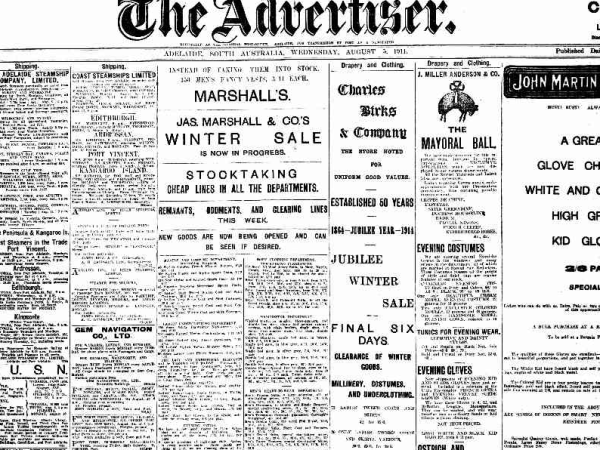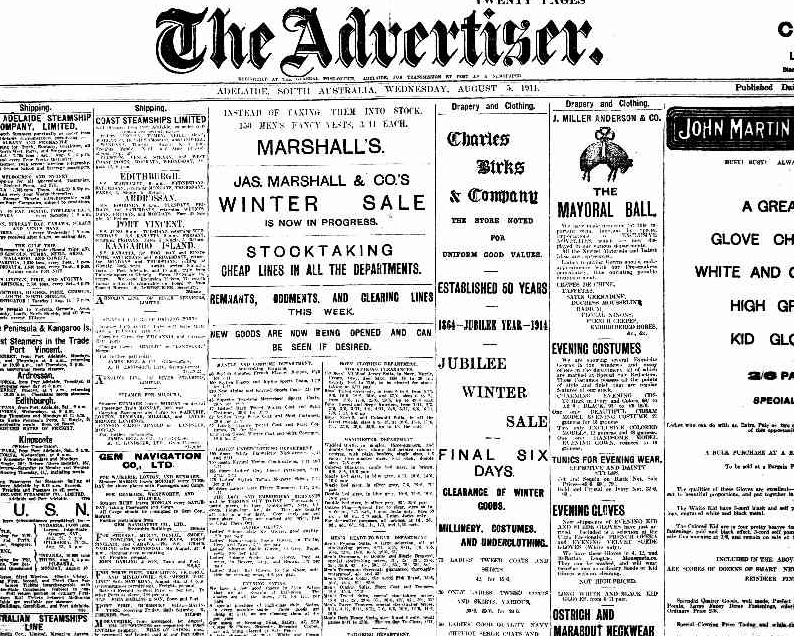Advertiser – October 1917
SOUTH AUSTRALIAN PLACE NAMES
… It is agreed that German names should be removed from our map, because we do not wish to perpetuate the racial memories and feelings which led originally to their bestowal…
The Bill is based on the report of the Nomenclature Committee, who prepared a schedule intended to give effect to Mr. Ponder’s motion for the abolition of place names of enemy origin and the substitution of others more agreeable to British sentiment. The new names proposed by the Committee are almost exclusively drawn from the aboriginal languages, and as the Government hold that this method has been carried a little too far, they have taken power in the Bill to substitute names other than those recommended where it is considered that an improvement can be effected. All the German place-names, of which there are so many in South Australia, have become extremely unpopular, and some of them, such as Kaiserstuhl and Sedan, are particularly offensive…
Blumberg, Hahndorf, Lobethal, Grunthal, the Rhine, and similar designations taken from the language of a cruel and unscrupulous foe, must be expunged from the map of a British State. It does not follow, however, that in every instance it is desirable to substitute an aboriginal name. The native names as a rule stand for nothing in our history, or in any other history for that matter. In some cases they may have romantic or poetical associations, but it can hardly be maintained that the life of the Australian black was especially rich in these, or that the use of their vocabulary does much more than preserve some memory of an interesting race which is slowly passing away…
11 October 1917 p6
WOMEN’S WAGES:BASIC RATES FRO FACTORY HANDS
… A deputation from the Women’s Labour Conference to-day requested the State Premier to negotiate to obtain improved conditions for women employed in factories.
It was argued that there should be a basic wage, below which nobody should be paid, and it was declared that thousands of girls received a rate of pay that was an invitation to immorality…
13 October 1917 p10
THE IMPERIAL CAMEL CORPS
Lieutenant Oliver Hogue (Trooper “Bluegum”) writes from Sinai to the Australian Comforts Fund (of which the League of Loyal Woman is the South Australian division):-
“I know how very grateful our boys are for the kindnesses showered on them by the Australian Comforts Fund during the last three years. This applies very specially to the Camel Corps. The various regiments and battalions have their own comforts funds, but the “Cameliers” are nobody’s children. They come from every out-of-the-way corner of Australia, and their folk at home are so scattered that a special comforts fund for them would be a difficult thing to organise…
22 October 1917 p6
FIRST LADY LAWYER: CEREMONY AT THE FULL COURT
The ceremony of admitting the first lady practitioner to the South Australian bar attracted a large number of spectators, including many young women, to the Full Court on Saturday…Mr. T. S. Poole, in moving for the admission of Miss Mary Cecil Kitson, said she passed as Bachelor of Laws on December 15, 1916, and completed her articles on August 27 of this year. Her application was made possible by an Act of 1011, which enabled women to practise the profession of law.
23 October 1917 p5
THE EAST WEST LINE: FIRST TRAIN ON THE WAY
The special train carrying passengers who are to travel by the first train over the East-West railway, left Adelaide at 8.55 o’clock yesterday morning. It was occupied mainly by official passengers invited by the Commonwealth Government…
The train will reach Kalgoorlie in time to connect with the west-bound express for Perth at 5 p.m. to-morrow, arriving at Perth at 8.30 a.m. on Thursday. The return train to Port Augusta will leave Kalgoorlie on Thursday, reaching Adelaide on Saturday at 3.30 p.m
25 October 1917 p6
CHRISTMAS AT THE FRONT
…The Christmas mail to soldiers abroad filled 12,130 bags, which is a record. It was made up of 961 bags of letters and packets, and 11,169 parcels
31 October 1917 p7
RELEIF FOR ANZACS PROPOSAL TURNED DOWN
… The proposal that the survivors of the first Australian contingent, who have now been on active service for over three years, should be brought to Australia for a brief period of leave at Christmas, has been found impracticable…



